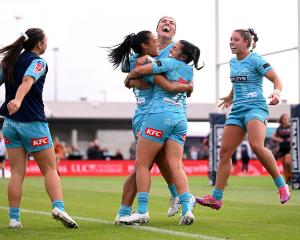After a meeting of Sanzar officials in Dubai on Wednesday, it was agreed to form a working party and appoint a project manager to look at developing a Super 15 competition.
The likely scenario is to have one more team, most probably based in Australia, though whether it would be full of Australians, Pacific Islanders or Japanese is unclear.
Teams would be split into conferences and each team would play teams from the same country on a home and away basis every year, therefore the Highlanders would play the Chiefs, Blues, Hurricanes and Crusaders home and away once a year.
They would then play overseas teams once, although it has not been decided whether it would be a full round robin.
Not having a full round robin has the disadvantage of some teams getting a schedule against weaker opposition.
Reid said Sanzar research showed the games most people cared about and were interested in were the matches between teams from the same country, so it made sense to schedule more derby matches, which attracted bigger crowds.
"A lot of people are saying that the competition needs a tweak and I'd agree with that. They've got to do something."
The finals were also likely to be enlarged.
With just the top four making it through to the finals in the current Super 14 format, it is one of the toughest competitions in all sports to make post-season play.
It is likely to go to at least six teams in the finals, which Reid said would create more interest at the later stages of the competition.
The new competition would probably start later, in March.
Reid said February was too early to play rugby, with fans still in summer mode and players suffering in the intense heat.
Cheetahs captain Juan Smith collapsed in a Brisbane dressing room last Sunday after his side's match against the Reds and was taken to hospital.
The match was played on a hot Brisbane afternoon and led to calls to start the season later.
But starting the competition later and encompassing more games would lead to a competition which could run for up to 26 weeks, starting in mid-March and not finishing until August.
The playing calender was already tight with June internationals against touring northern hemisphere sides, the South Africans wanting to maintain the Currie Cup domestic competition, and the Tri-Nations tournament, while there were end-of-year international tours to consider.
Reid said the Air New Zealand Cup would continue but would become semi-professional, with limited involvement by Super 14 players.
"It's just not affordable to have a fully professional domestic competition. And, if we're honest, it never has been affordable."
He said logistically it would only be possible to get another team going in 2011, as it was unrealistic to organise an entire team and infrastructure to start playing as soon as February next year.
Sanzar had to present a deal to its broadcasters by the middle of this year for coverage, starting from 2011.
Sanzar also said yesterday it had considered a further report from Argentina about that nation being included in the Tri-Nations.
The Sanzar working party would carry out further analysis on the viability of Argentina joining the Tri-Nations.
Argentina finished third at the 2007 Rugby World Cup but did not have a major competition to play in.













